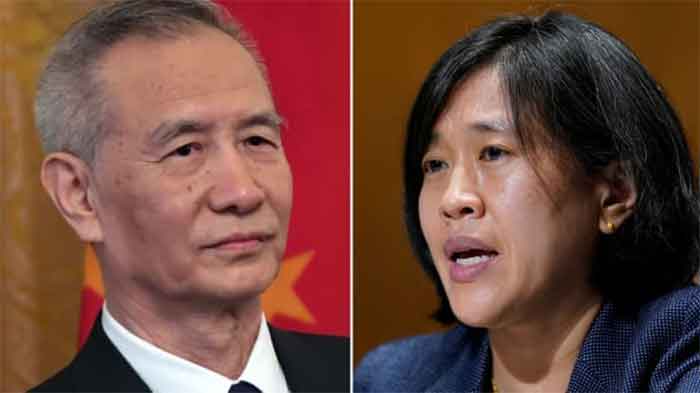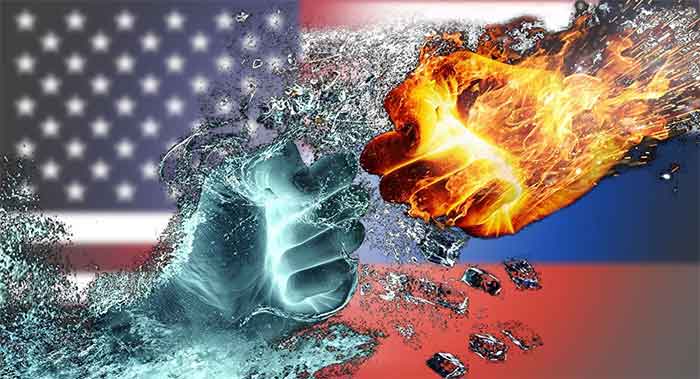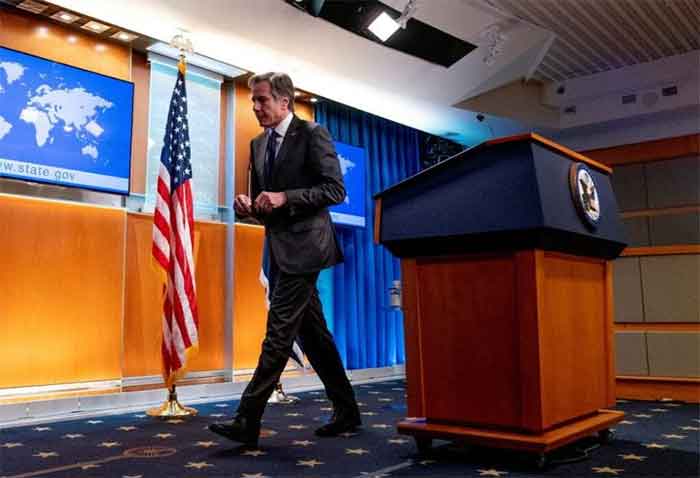
Russophobia and Sinophobia are so widely prevalent among the US foreign policy elite… Despite US statements against Kremlin or Beijing…highlighted by Indian media…
Neither China nor Russia regards that the US is qualified to speak to them from a position of strength.
Biden has outlined that his foreign policy vision will be domestically driven and linked to the American middle class, that is to say, intended to create jobs, promote economic growth, modernise infrastructure and ensure equity in American society.
Thus, the need to engage with China on trade issues is perfectly understandable at a time when America’s farmers have lost the vast majority of what was once a $24 billion market in China.
***
Anyone who tried to divine the Russia policy of the Biden presidency out of the corpus of statements by current and prospective officials in the new administration would know by now that the range of instincts and perspectives contained in those statements did not really reflect or anticipate what was to happen — the upcoming summit meeting between Presidents Joe Biden and Vladimir Putin in Geneva on June 16.
It is a reasonable conclusion that the Russia policy will be ultimately shaped by Biden’s priorities and his effectiveness in advancing them. Biden has brought into the Oval Office far more experience in foreign affairs and diplomacy than any of his last four predecessors put together — Bill Clinton, George W. Bush, Barack Obama and Donald Trump.
Put simply, Biden’s leadership is and will remain the most important component in the making of the US foreign policy in the present administration.
Therefore, the blunt remarks regarding China policy made by Kurt Campbell, the coordinator for Indo-Pacific affairs on the National Security Council at an event hosted by Stanford University on Wednesday raise eyebrows.
Campbell proclaimed, “The period that was broadly described as engagement has come to an end.” He forecast that the US policy toward China will now operate under a “new set of strategic parameters,” adding that “the dominant paradigm is going to be competition.”
Reportedly, Campbell blamed Chinese President Xi Jinping for being responsible for the shift in the US policy — citing the military clashes on the China-India border, an “economic campaign” against Australia and China’s alleged “wolf warrior” diplomacy (namely, Chinese diplomats’ robust pushback lately at brazen, belligerent, provocative American rhetoric.)
Campbell estimated that Beijing’s behaviour was emblematic of a shift toward “harsh power, or hard power,” which “signals that China is determined to play a more assertive role.”
Campbell was apparently present at the talks Secretary of State Antony Blinken and National Security Advisor Jake Sullivan had with the Chinese Politburo member Yang Jiechi and State Councilor and Foreign Minister Wang Yi at Alaska in April. Possibly, it was Campbell’s bright idea that Blinken should take a belligerent tone and go on the offensive right at the outset of the talks in Anchorage.
But it boomeranged. And Campbell is now putting the blame for the mishap on President Xi whom he described as “deeply ideological, but also quite unsentimental” and “not terribly interested in economics,” — a mixed bag of personal attributes, more from a contrarian disposition than moral conviction. Evidently, Campbell is smarting under the rebuff at Alaska — and that too in full view of the TV cameras — and has lashed out at Xi, Yang and Wang.
Now, does this gibberish become the stuff of the superpower’s policy toward another superpower? Importantly, does it represent Biden’s opinion? Biden has claimed an intimate knowledge of Xi at a uniquely personal level in formal, informal and casual settings both in China and in the US.
Campbell spoke almost like Blinken used to speak about Russia in the European capitals up until very recently when he finally began sensing that Biden intended to have an early meeting with Putin and instructed Sullivan to arrange the summit quickly.
Curiously, on the same day Campbell was firing away at Xi, the new US Trade Representative Katherine Tai held an “introductory virtual meeting” with the Chinese Vice Premier Liu He, “to discuss the importance of the trade relationship” between the US and China.
The US readout said they had a “candid exchange.” Tai discussed “the guiding principles” of the Biden administration’s “worker-centered trade policy” and her own ongoing review of the US-China trade relationship. The readout highlighted that Tai “looks forward to future discussions” with Liu.
Reporting on that “candid” discussion, the Global Times has commented that it sent “a positive signal that the world’s two biggest economies are restarting communication amid growing uncertainties and lingering disputes over a wide range of issues.” It said the exchanges were “candid, pragmatic and constructive” and highlighted that the two officials agreed “to continue to maintain communication.”
Campbell who holds a senior position in the White House bureaucracy but lo and behold, within hours of his diatribe against Xi, Biden’s cabinet minister sets the ball rolling to engage her Chinese counterpart on what is undoubtedly one of the most vital templates of the US-China relationship — and indeed of Biden’s foreign policy for the American middle class.
The very same “Russia syndrome” is appearing here. There is no unified coherent policy line regarding the US’ engagement with the Kremlin (or Beijing.) Vladimir Vasilyev, a senior pundit at the Institute for US and Canadian Studies under the Russian Academy of Sciences in Moscow said recently, “Biden believes that he will benefit from meeting with Putin since he will show that not only Trump can find common ground with troublesome foreign leaders for America.
“But, perhaps, Blinken regards the upcoming talks more skeptically. There is an impression that now the system of Russian-US relations is overseen in Washington by several ‘heads.’ This could disrupt the talks, or they could end without any result.”
Actually, an experienced Russia watcher and former US diplomat Rose Gottemoeller (who previously served as Deputy Secretary General of NATO and as Undersecretary of State for Arms Control and International Security at the State Department) is clear-headed to anticipate that the Geneva summit is potentially capable of letting the two leaders establish a working relationship and lay the groundwork for future US-Russia cooperation!
“I see this summit as akin to the first meeting of Reagan and Mikhail Gorbachev in Geneva in 1985, the so-called ‘fireside summit.’ The two men had very direct and difficult conversations, but at the same time, they established a working relationship that made way for later progress,” Gottemoeller said.
Susan Sontag once said, ‘Nobody can think and hit someone at the same time.’ That seems to be the predicament of the officials in the Biden administration apropos of Russia and China. Russophobia and Sinophobia are so widely prevalent among the US foreign policy elite, while Biden’s own agenda would be to make these all-important relationships stable and predictable.
Biden has outlined that his foreign policy vision will be domestically driven and linked to the American middle class, that is to say, intended to create jobs, promote economic growth, modernise infrastructure and ensure equity in American society.
Thus, the need to engage with China on trade issues is perfectly understandable at a time when America’s farmers have lost the vast majority of what was once a $24 billion market in China.
Lifting tariffs will be a key issue to be discussed in later trade talks between China and the US, and the two countries are likely to reach consensus at least on incremental removal of tariffs. Suffice to say, engagement with China is unavoidable.
On the other hand, there has been an overall decline of US hegemony in recent years and the US pressure and hostility toward China and Russia have only prompted those two countries to stand together.
Neither China nor Russia regards that the US is qualified to speak to them from a position of strength. Yang said this to Blinken at Alaska in March — and Kremlin Spokesman Dmitry Peskov echoed it immediately, saying Russia won’t let the US speak with it “from the position of force.”
Indeed, Putin might visit China after his summit with Biden. The 20th anniversary of the signing of 2001 China-Russia Treaty of Friendship on July 16, and the centenary of the founding of the Chinese Communist Party on July 1 have been mentioned in Chinese media as “friendly occasions.”
Campbell overlooks that the US-Russia-China triangle no longer works on the lines that Henry Kissinger wrote about. The decline in Washington’s strength and influence globally necessitates that in regions such as Eurasia, Central Asia, West Asia and Asia-Pacific, Beijing and Moscow will increasingly consider how to figure out new regional orders.
Strategic communication and engagement on the part of the Biden administration with Russia and China becomes imperative so that the replacement of the dysfunctional, archaic “Pax Americana” proceeds without friction — be it in regard of the situation around North Korea and Iran, the Israel-Palestine conflict or the wars in Afghanistan and Syria.
***
Posted in his blog, indianpunchline, on May 28, 2021, by the author.
Ambassador M K Bhadrakumar served the Indian Foreign Service for more than 29 years. He introduces about himself thus: “Roughly half of the 3 decades of my diplomatic career was devoted to assignments on the territories of the former Soviet Union and to Pakistan, Iran and Afghanistan. Other overseas postings included South Korea, Sri Lanka, Germany, and Turkey. I write mainly on Indian foreign policy and the affairs of the Middle East, Eurasia, Central Asia, South Asia and the Asia-Pacific…”
His mail ID : [email protected]
GET COUNTERCURRENTS DAILY NEWSLETTER STRAIGHT TO YOUR INBOX















































